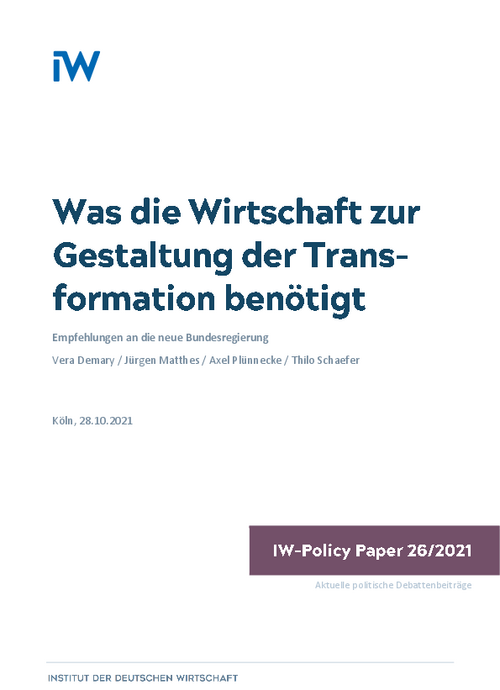Germany is facing major structural challenges stemming from the four trends digitalisation, decarbonisation, demographics and de-globalisation. These trends occur simultaneously and cause additional demand for policy, especially at their interfaces, so that the transformation process can be shaped successfully.

What business needs to shape the transformation: Recommendations to the new federal government

Germany is facing major structural challenges stemming from the four trends digitalisation, decarbonisation, demographics and de-globalisation. These trends occur simultaneously and cause additional demand for policy, especially at their interfaces, so that the transformation process can be shaped successfully.
A company survey conducted among 1,100 German companies from industry and industry-related services clarifies the concrete challenges the German economy is facing in the transformation process and how a new government can support the economy in this process.
The analysis arrives at seven recommendations. Against the background of the four aforementioned trends, it is crucial to expand the digital infrastructure, create innovation-friendly framework conditions for climate protection, strengthen research, education and immigration, and pursue a robust trade policy towards China. Furthermore, policy-makers need to pay attention to comparative advantages in climate protection programmes, to intensify transatlantic cooperation in digitalisation and to strengthen digital education for climate protection. These seven recommendations result in concrete measures, such as a faster expansion of the digital infrastructure through a speedy implementation of the relevant mobile network funding regulation and an acceleration of the procedures for funding the expansion. The use of fossil fuels should become more expensive through CO2 pricing and at the same time the use of electricity from renewable sources should become more attractive through a reduction in electricity tax and the EEG levy. A common CO2 price should be set through a climate club that can prevent companies from relocating. An additional 21 billion euros or so should be invested annually in education and research. The 3.5 per cent R&D target in GDP should be achieved through an expansion of the research allowance and mission-oriented research funding at the interface of digitalisation and decarbonisation should be strengthened. The digitalisation of education should be continued, STEM education strengthened and a high-quality all-day infrastructure created in day-care centres and schools. A more robust trade policy towards China means making greater use of the EU's trade defence instruments, in particular anti-subsidy procedures, and making them more accessible to SMEs. In addition, the EU needs an effective anti-subsidy instrument vis-à-vis third countries, for which the new federal government should campaign vigorously in Brussels.
The paper summarising the result from exploratory talks of the German parties SPD, Bündnis 90/DIE GRÜNEN and FDP already indicates possible impulses with regard to these recommendations, such as improvements in immigration or the expansion of renewable energies. The paper also formulates at least basic approaches for a more robust trade policy towards China, which point in the right direction but still need to be filled with more specific content. Strengthening research and academic training at the interface of digitalisation and decarbonisation, as well as digitalisation in general and the digitalisation of public administration, also require further specification in the coalition negotiations.

What business needs to shape the transformation: Recommendations to the new federal government

More on the topic

Tailoring the Truth: evidence on parliamentarians’ responsiveness and misinformation toleration from a field experiment
The rise of populist radical right parties (PRRPs) is largely seen to have been triggered by a dealignment between voters and political elites and to have triggered an increasing supply of misinformation.
IW
Works Council Elections 2022: Results of the IW Works Council Election Survey
Works councils receive strong backing from the workforces they represent. Nevertheless, the drop in turnout reported in the IW Works Council Election Survey 2022 suggests that this support is declining.
IW